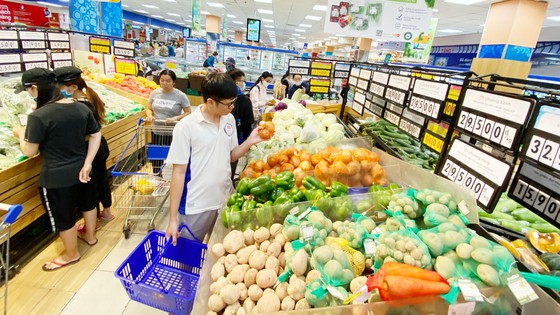 Economy
Economy


|
| Customers at a suppermarket in HCM City. — Photo sggp.org.vn |
HCM CITY — Preferential policies related to corporate income tax, value-added tax and personal income tax are among the drastic measures that are being taken to help businesses stay afloat through the COVID-19 outbreak, economic experts and businesses in HCM City have said.
Other policies include cutting in bank loan rates, permission to delay repayment of loans and reduction of social insurance and health insurance contributions.
Trần Hoàng Ngân, head of the HCM City Institute for Development Studies, said the ongoing spread of the coronavirus has become one of the biggest threats to the global economy. Việt Nam is not an exception.
Businesses have been hit hard by the pandemic due to disruptions of supply chains, labourers and markets, as well as falls in orders and slowing production, Ngân said at a meeting held on Tuesday in HCM City.
He cited the Organisation for Economic Co-operation and Development (OECD)’s latest Interim Economic Outlook that presents both a best-case scenario in which the extent of the coronavirus is broadly contained and a “domino” prospect of contagion that is more widespread.
Even in the best-case scenario of limited outbreaks in countries outside China, a sharp slowdown in world growth is expected in the first half of 2020 as supply chains and commodities are hit, tourism drops and confidence falters, according to the report.
Global economic growth is seen falling to 2.4 per cent for the whole year, compared to an already weak 2.9 per cent in 2019. It is then expected to rise to a modest 3.3 per cent in 2021.
But broader contagion across the wider Asia-Pacific region and advanced economies could cut global growth to as low as 1.5 per cent this year, halving the OECD’s previous 2020 projection from last November.
In both cases, the OECD has called on governments to act immediately to limit the spread of the coronavirus, protect people and businesses from its effects, and shore up demand in the economy.
In the first two months of the year, HCM City’s industrial production index dropped by 2 per cent compared to the same period last year.
During the period, commercial centres in the city reported a fall of 40-50 per cent in the number of customers, and revenues of convenient stores plummeted by 40 per cent.
Many stores in the city are closed as the consequence of the sharp downturn due to the coronavirus pandemic.
Fifty travel firms in the city reported that they served a total of 335,800 domestic and international tourists in the first two months of the year, a year-on-year decline of 62 per cent, resulting in a 65 per cent drop in tourism revenues.
During the period, hotels saw an average revenue drop of 25.4 per cent.
Three- to five-star hotels are expecting a year-on-year drop in revenues of 62 per cent in March and April.
Other sectors that are likely to be more affected by the virus outbreak due to the dependence on China for intermediate goods include textile and garment, leather and footwear, rubber and plastics.
Rescue packages
Ngân said that rescue packages and policy measures for businesses hit by COVID-19 adopted by other countries such as Singapore, Thailand and South Korea should be considered for flexible adaptation in Việt Nam to soften the impact of the coronavirus pandemic.
Trần Thiên Long, deputy chairman of the HCM City Export Processing Zone and Industrial Park Authority’s Business Association, said firms in the export processing zones and industrial parks reported that their revenues in the first quarter of this year are expected to drop by 25-50 per cent compared to the same period last year.
Travel firms said that it would take at least two years to recover from the pandemic crisis.
Vũ Kim Hạnh, chairwoman of the High Quality Vietnamese Product Business Association, said small and medium-sized businesses were in urgent need of support including bank loans and tax exemption, among other preferential policies.
There should be clear distribution of the credit package from the Government to help businesses overcome the crisis, Hạnh said.
A credit package worth VNĐ250 trillion (US$10.7 billion) to support those affected by the COVID-19 outbreak has been approved by the Prime Minister. — VNS




